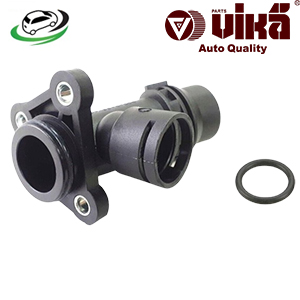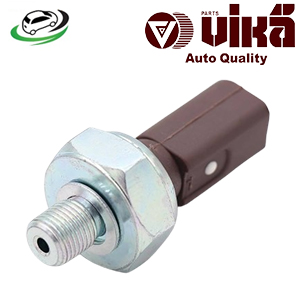-17%
Get Engine Oil Cooler Audi A4 Q5 1.8T 2.0T/A5/A4 Quattro/A5 Quattro/A6/A6 Quattro/Eos/GTI/Tiguan 06J117021J
The engine oil cooler is a critical component in modern engines designed to maintain optimal oil temperature, ensuring efficient engine performance and longevity. By managing the temperature of the engine oil, the cooler helps prevent overheating, reduces engine wear, and enhances overall engine efficiency. Understanding the functionality, types, symptoms of failure, and maintenance of the engine oil cooler is crucial for vehicle owners and automotive technicians.
Functionality of the Engine Oil Cooler
The engine oil cooler serves several key functions:
- Temperature Regulation: The primary role of the oil cooler is to regulate the temperature of the engine oil. Engine oil becomes more viscous at high temperatures, which can impair its ability to lubricate engine components effectively. By cooling the oil, the cooler ensures it remains at an optimal temperature for efficient lubrication.
- Enhanced Lubrication: Properly cooled oil maintains its viscosity, ensuring that it can effectively lubricate engine parts. This reduces friction and wear, helping to extend the life of the engine components.
- Prevention of Overheating: The cooler helps prevent the engine oil from reaching excessive temperatures, which can lead to overheating and potential engine damage. By dissipating heat, the cooler maintains a stable operating temperature.
- Improved Engine Performance: Maintaining optimal oil temperature contributes to smoother engine operation and improved performance. Proper lubrication and cooling ensure that the engine runs efficiently and reliably.
Components of the Engine Oil Cooler
An engine oil cooler system typically includes the following components:
- Oil Cooler Core: The core is the main part of the cooler where the heat exchange occurs. It consists of a series of metal fins and tubes that allow heat to be transferred from the oil to the surrounding air or coolant.
- Oil Lines: These are hoses or pipes that carry hot oil from the engine to the cooler and return the cooled oil back to the engine. They must be durable and resistant to high temperatures and pressure.
- Mounting Brackets: These secure the oil cooler in place and ensure it is properly positioned within the engine bay or radiator area.
- Coolant or Air Flow: Depending on the design, the cooler may rely on air flow (air-to-oil cooler) or coolant flow (water-to-oil cooler) to facilitate heat dissipation.
- Thermostat (Optional): Some oil cooler systems include a thermostat to regulate the flow of oil through the cooler based on its temperature. This helps ensure the oil reaches its optimal operating temperature.
Types of Engine Oil Coolers
Engine oil coolers come in various designs, depending on their application and cooling method:
- Air-to-Oil Coolers: These coolers use air flow to dissipate heat from the engine oil. The oil flows through the cooler core, and air passing over the core helps to cool the oil. Air-to-oil coolers are commonly found in many vehicles and are often mounted in front of the radiator.
- Water-to-Oil Coolers: These coolers use engine coolant to absorb heat from the oil. The oil flows through a series of passages within the cooler core, while coolant flows around the outside, transferring heat away from the oil. Water-to-oil coolers are often integrated into the radiator or located in the engine block.
- Combined Air and Water Coolers: Some systems use a combination of air and water cooling to achieve optimal oil temperature regulation. These coolers can provide more efficient temperature control in various driving conditions.
Symptoms of a Failing Engine Oil Cooler
Recognizing the signs of a failing engine oil cooler is essential for preventing engine damage and maintaining performance:
- Overheating Engine: If the oil cooler is not functioning properly, the engine oil may overheat, leading to engine overheating. This can be indicated by an elevated temperature gauge or warning light on the dashboard.
- Low Oil Pressure: A malfunctioning oil cooler can cause low oil pressure, which may result in poor engine performance or unusual noises. Monitor the oil pressure gauge for any significant drops.
- Oil Leaks: Leaks around the oil cooler or its lines can indicate a problem. Leaking oil can lead to low oil levels and potential engine damage.
- Coolant Contamination: If the oil cooler fails, it can cause coolant to mix with the engine oil, resulting in contaminated oil. This may be indicated by a milky appearance of the oil or coolant in the oil.
- Unusual Engine Behavior: Poor engine performance, increased exhaust smoke, or rough idling can be symptoms of a failing oil cooler, as overheating oil affects engine operation.
Causes of Engine Oil Cooler Failure
Several factors can contribute to engine oil cooler failure:
- Wear and Tear: Over time, the oil cooler and its components can wear out due to exposure to high temperatures, pressure, and vibration. This can lead to leaks or reduced cooling efficiency.
- Corrosion: Corrosion can occur due to the interaction between coolant, oil, and the cooler materials. This is especially common in water-to-oil coolers, where coolant can corrode the cooler if not properly maintained.
- Clogs and Blockages: Contaminants or debris in the oil can cause clogs or blockages in the cooler core, reducing its effectiveness and leading to overheating.
- Physical Damage: Impacts or accidents can damage the oil cooler or its lines, leading to leaks or poor cooling performance.
- Faulty Thermostat: In systems with an oil cooler thermostat, a faulty thermostat can prevent proper regulation of oil flow through the cooler, affecting temperature control.
Maintenance and Replacement
Proper maintenance of the engine oil cooler involves regular inspections and timely replacements to ensure optimal performance:
- Regular Inspections: Periodically inspect the oil cooler and its components for signs of wear, damage, or leaks. Check for coolant or oil stains around the cooler and its lines.
- Monitor Oil Temperature: Keep an eye on the engine oil temperature and pressure gauges. Abnormal readings can indicate issues with the oil cooler or cooling system.
- Follow Manufacturer’s Recommendations: Adhere to the manufacturer’s recommended maintenance intervals for the oil cooler and cooling system components. This information can be found in the vehicle’s owner’s manual.
- Replace as Needed: If any symptoms of a failing oil cooler are observed, or if the cooler is damaged or leaking, replace it promptly to prevent potential engine damage and overheating.
Replacement Process
Replacing an engine oil cooler typically involves the following steps:
- Prepare the Vehicle: Ensure the engine is off and has cooled down. Open the hood and locate the oil cooler. If necessary, lift the vehicle using a jack and jack stands to access the cooler.
- Drain the Oil: Before removing the cooler, drain the engine oil to prevent spills. This can be done by opening the oil drain plug and allowing the oil to flow into a drain pan.
- Disconnect Hoses: Remove the oil lines connected to the cooler. Be prepared for some residual oil to spill during this process.
- Remove the Old Cooler: Unbolt or unfasten the old oil cooler from its mounting brackets. Carefully remove it from the engine bay.
- Install the New Cooler: Position the new oil cooler in place and secure it with the appropriate bolts or mounting hardware. Reconnect the oil lines and ensure they are properly sealed.
- Refill the Oil: Refill the engine with the recommended type and amount of oil. Check for leaks around the cooler and lines.
- Test the Vehicle: Start the engine and monitor for any signs of leaks or unusual behavior. Check the oil temperature and pressure gauges to ensure proper operation.
Importance of Quality Engine Oil Coolers
Using high-quality engine oil coolers is essential for several reasons:
- Performance: Quality coolers ensure effective temperature regulation, maintaining optimal oil viscosity and engine performance.
- Durability: High-quality materials and construction enhance the cooler’s longevity, reducing the need for frequent replacements and preventing premature failure.
- Reliability: Reliable coolers provide consistent cooling performance, preventing overheating and potential engine damage.
- Cost-Effectiveness: Investing in a quality oil cooler can prevent costly repairs and maintain overall engine efficiency.
Follow us on Facebook for more parts.



